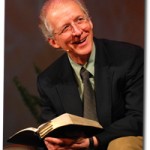![spurgeon_sm[1]](https://effectualgrace.com/wp-content/uploads/2011/08/spurgeon_sm11-300x225.jpg)
Who else, would call someone that fails to preach sound doctrine from the pulpit a “retailer of secondhand windbags?”
“Rousing appeals to the affections are excellent, but if they are not backed up by instruction, they are a mere flash in the pan, powder consumed and no shot sent home. Rest assured that the most fervid revivalism will wear itself out in mere smoke, if it be not maintained by the fuel of teaching. The divine method is to put the law in the mind, and then write it on the heart; the judgment is enlightened, and then the passions subdued. Read Hebrews 8:10, and follow the model of the covenant of grace. Gouge’s note on that place may with fitness be quoted here: “Ministers are herein to imitate God, and, to their best endeavor, to instruct people in the mysteries of godliness, and to teach them what to believe and practice, and then to stir them up in act and deed, to do what they are instructed to do. Their labor otherwise is like to be in vain. Neglect of this course is a main cause that men fall into many errors as they do in these days.” I may add that this last remark has gained more force in our times; it is among uninstructed flocks that the wolves of popery make havoc; sound teaching is the best protection from the heresies which ravage right and left among us. Sound information upon scriptural subjects your hearers crave for, and must have. Accurate explanations of holy Scripture they are entitled to, and if you are “an interpreter, one of a thousand,” a real messenger of heaven, you will yield them plenteously. Whatever else may be present, the absence of edifying, instructive truth, like the absence of flour from bread, will be fatal. Estimated by their solid contents rather than their superficial area, many sermons are very poor specimens of godly discourse. I believe the remark is too well grounded that if you attend to a lecturer on astronomy or geology, during a short course you will obtain a tolerably clear view of his system; but if you listen, not only for twelve months, but for twelve years, to the common run of preachers, you will not arrive at anything like an idea of their system of theology. If it be so, it is a grievous fault, which cannot be too much deplored. Alas! the indistinct utterances of many concerning the grandest of eternal realities, and the dimness of thought in others with regard to fundamental truths, have given too much occasion for the criticism! Brethren, if you are not theologians, you are in your pastorates just nothing at all. You may be fine rhetoricians, and be rich in polished sentences, but without knowledge of the gospel, and aptness to teach it, you are but a sounding brass and a tinkling cymbal. Verbiage is too often the fig leaf which does duty as a covering for theological ignorance. Sounding periods are offered instead of sound doctrine, and rhetorical flourishes in the place of robust thought. Such things ought not to be. The abounding of empty declamation, and the absence of food for the soul, will turn a pulpit into a box of bombast, and inspire contempt instead of reverence. Unless we are instructive preachers, and really feed the people, we may be great quoters of elegant poetry, and mighty retailers of secondhand windbags, but we shall be like Nero of old, fiddling while Rome was burning and sending vessels to Alexandria to fetch sand for the arena while the populace starved for want of corn.” – C. H. Spurgeon – Lectures to My Students (pp. 74-75). Hendrickson Publishers. Kindle Edition.
HT: Reformed for His glory

 Well said Dr. Piper! I could not agree more. God has never taken a “risk.”
Well said Dr. Piper! I could not agree more. God has never taken a “risk.” 30 Minutes ago I received this e-mail from a former student of mine:
30 Minutes ago I received this e-mail from a former student of mine: Dr. Carl Trueman is Professor of Historical Theology and Church History at Westminster Theological Seminary in Philadelphia.
Dr. Carl Trueman is Professor of Historical Theology and Church History at Westminster Theological Seminary in Philadelphia. “till we all come to the unity of the faith” Ephesians 4:13
“till we all come to the unity of the faith” Ephesians 4:13 (1) If you did not read the post this week about Pastor PJ Smyth’s long battle with cancer and the lessons he has learned, the furnace doesn’t consume it refines. The furnace of suffering doesn’t shout out “forsaken by God,” it shouts out “loved by God!””
(1) If you did not read the post this week about Pastor PJ Smyth’s long battle with cancer and the lessons he has learned, the furnace doesn’t consume it refines. The furnace of suffering doesn’t shout out “forsaken by God,” it shouts out “loved by God!”” (3) Ligonier has some SUPER deals today on some excellent material in this week’s $5 Friday sale. Especially recommended is the 2003 National Conference series on CD, normally $65, but for today only is $5. I have heard this series and it is terrific. This is an amazing deal. Maybe worth getting a few of these CD sets as gifts for others – just a thought.
(3) Ligonier has some SUPER deals today on some excellent material in this week’s $5 Friday sale. Especially recommended is the 2003 National Conference series on CD, normally $65, but for today only is $5. I have heard this series and it is terrific. This is an amazing deal. Maybe worth getting a few of these CD sets as gifts for others – just a thought.